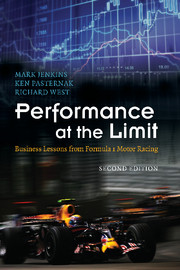Book contents
- Frontmatter
- Contents
- List of figures
- List of tables
- List of plates
- Acknowledgements
- Note on the reference system
- The Grand Prix experience
- 1 Introduction
- 2 Why Formula 1 motor racing?
- 3 The performance framework
- 4 The war for talent
- 5 Winning through teamwork
- 6 Capability through partnerships
- 7 The high-performance organisation
- 8 Integrating
- 9 Innovating
- 10 Transforming
- 11 Achieving and sustaining performance
- 12 Twelve business lessons from Formula 1 motor racing
- Appendix A Grand Prix Champions 1950–2008
- Appendix B Grand Prix Graveyard 1950–2008
- Appendix C Interview respondents
- References
- Index
- Plate section 1
- Plate section 2
5 - Winning through teamwork
Published online by Cambridge University Press: 05 August 2013
- Frontmatter
- Contents
- List of figures
- List of tables
- List of plates
- Acknowledgements
- Note on the reference system
- The Grand Prix experience
- 1 Introduction
- 2 Why Formula 1 motor racing?
- 3 The performance framework
- 4 The war for talent
- 5 Winning through teamwork
- 6 Capability through partnerships
- 7 The high-performance organisation
- 8 Integrating
- 9 Innovating
- 10 Transforming
- 11 Achieving and sustaining performance
- 12 Twelve business lessons from Formula 1 motor racing
- Appendix A Grand Prix Champions 1950–2008
- Appendix B Grand Prix Graveyard 1950–2008
- Appendix C Interview respondents
- References
- Index
- Plate section 1
- Plate section 2
Summary
Formula 1 is entirely teamwork related; there’s almost a dependency on teamwork.
Sir Jackie Stewart, former Triple World Drivers’ Champion and former Formula 1 Team PrincipalFormula 1 – a team sport
At the end of every Grand Prix television broadcast viewers can watch a post-race press conference, where the three podium finishers are sitting behind a table, the winner in the centre with the second-place finisher seated to his right and the third-place finisher to his left. Sporting their sponsors’ caps and watches with their overalls closed to the neck, they towel sweat from their brows and pour themselves drinks from a pitcher containing an unidentified orange-coloured liquid. In turn they answer questions about the race from an off-screen interviewer. After doing so, the drivers whose native tongues are something other than English make a short comment in their own language to their fans at home. Invariably, the driver graciously pays tribute to the many contributors within the team who had made it possible for him to finish in the top three.
And rightly so. Formula 1 drivers know they would not be racing week after week without the extraordinary efforts of the entire team. While the driver is seemingly alone as he navigates the circuit, Formula 1 is a team sport and the skills of the best driver cannot guarantee victory without a well-coordinated and efficiently executing team behind him.
- Type
- Chapter
- Information
- Performance at the LimitBusiness Lessons from Formula 1 Motor Racing, pp. 67 - 85Publisher: Cambridge University PressPrint publication year: 2009



